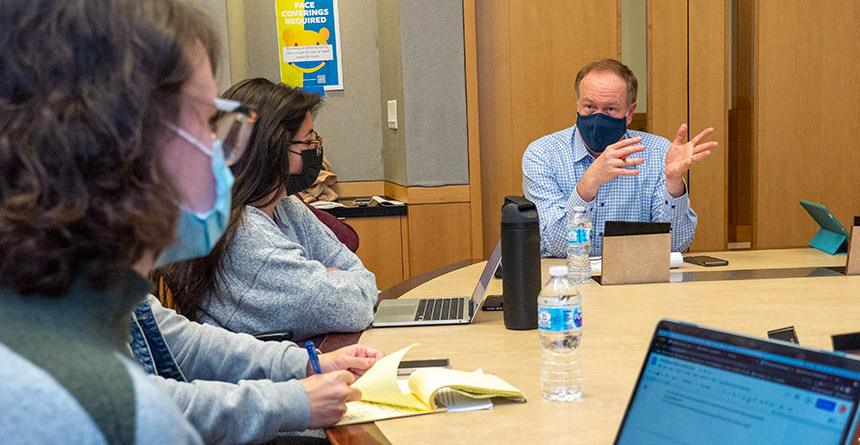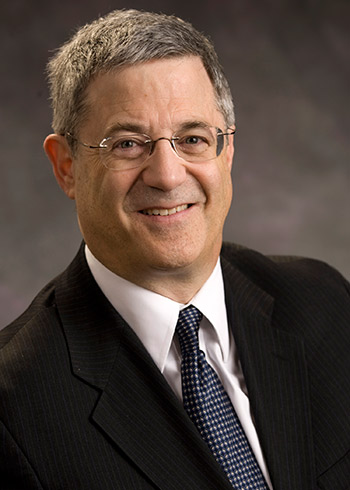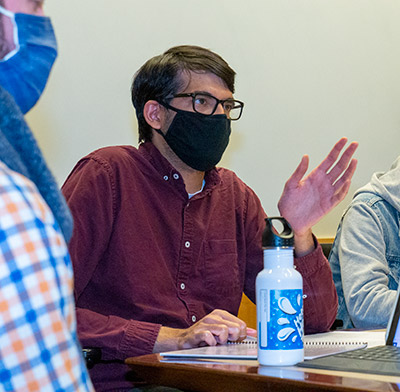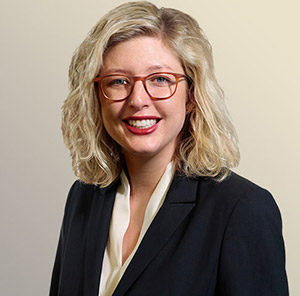
By Andrew Cohen
Years ago, while consulting with law firms to help train their associates, Henry Hecht was asked to create a training program on depositions: how to take them, defend them, and prepare a witness for them. Not wanting to be a “talking head,” Hecht — Berkeley Law’s Herma Hill Kay Lecturer in Residence — designed a learning-by-doing workshop where associates took part in simulated depositions and got pointed feedback.
“Offering a similar course at Berkeley Law was the natural next step,” he says.

When Hecht began teaching at Berkeley Law in 1983, there were no offerings on Depositions — courses on how to try cases were seen as more relevant. But when a major study showed that in 2006 only 1.3% of U.S. district court civil cases reached trial, he proposed a course on Client Interviewing & Depositions. Discovering that a 14-week semester wasn’t enough to sufficiently cover both subjects, his course devoted purely to depositions was soon born.
Hecht developed a carefully designed 14-week course where students conduct mock depositions, receive feedback in small groups, and glean valuable insights from both alumni litigators and Hecht. Last semester, nine Berkeley Law graduates — eight of them Hecht’s former students — came to offer pointers.
“I’ve been visiting Henry’s Depositions classes for about 15 years,” says Jeff Homrig ’01, a partner at Latham & Watkins and the firm’s intellectual property litigation vice chair, who took two courses with Hecht when he was a student. “Once I began to practice, I realized how important it is to gain practical experience in law school. Henry’s class gave me a great foundation to take depositions as a lawyer — real practical experience that pushed me up the learning curve. I’m deeply grateful for that, and I wanted to help pass that experience along to others.”
Hecht invites litigators from wide-ranging backgrounds to showcase the legal community’s diversity — and the many paths to deposition success.
“They bring their own way of doing things to the problems at hand,” he explains. “My philosophy of skills teaching is that there’s more than one way to accomplish an objective. The guests demonstrate the truth of that approach.”
The inside scoop
Third-year student Jenna Forster, who took his Depositions course last semester, found that it clarified several uncertainties and demystified a vital part of the litigation process.
“As a paralegal before law school and a summer associate during law school, I’d watch lawyers try things during depositions and ask myself, ‘Are they really allowed to do that?’” Forster says. “It was great to learn the rules of the road, and what those rules actually look like in practice. Because of this, I know I’ll feel much more confident when it comes time for me to take or defend my first real one.”

The course includes other unique features that reflect Hecht’s commitment to provide a top training experience.
Each semester, he recruits UC Berkeley undergraduates to play the role of witnesses. Every year, some of them apply to law school and ask him to be a reference.
“Preparing witnesses is such an important part of deposition practice,” Hecht says. “I wanted the witnesses to be people that my students hadn’t met before. Using undergraduates to play the witness roles makes the simulations more realistic.”
Working with Ana Fatima Costa of Costa Coaching & Consulting, Hecht has her student court reporters transcribe the testimony and provide rough transcripts to his students for their review. Receiving a transcript as a law student is rare, he says, and another opportunity to learn.
In addition, Hecht’s students are video recorded as deposition takers and defenders and meet individually with him outside of class to review the video, allowing for a deep dive into the mock depositions they took and defended.
“One great thing about the class is that it puts each student in the cockpit repeatedly, where they get used to their role and have to make decisions on the fly,” Homrig says. “We break down what they did, what worked and what didn’t, and then they try another deposition the next week.”
No stone unturned
The visiting attorneys explain the importance of reading witnesses and opposing attorneys, and how to use tools such as tone, pace, volume, body language, and personality to influence their behavior — which in turn influences the substance of the case.

“You can’t beat that type of access to highly-skilled lawyers as a law student,” says Bailey Langner ’15, an associate at King & Spalding who took Hecht’s class and now helps his current students. “Their real-life examples, coupled with Henry’s lessons and feedback, drove home for me the importance of both mastering the basics and developing my own deposition style.”
Forster, who will start her plaintiff-side litigation career at Lieff Cabraser this fall, agrees. She says the visiting attorneys “gave us really helpful feedback informed by their own experiences, whether it was advice for how to avoid objections or anecdotes about how to deal with difficult witnesses.”
Langner notes that the mechanics of a deposition — marking exhibits, going on and off the record, having your every word recorded — can be intimidating for new lawyers even before they get to the substantive legal matters at issue.
She says the experience she got as a student in his class “gave me the confidence to take my first deposition as a first-year associate.” In turn, her early successes taking and defending depositions “gave the partners at my firm confidence that I could handle myself, leading to additional opportunities.”
Langner calls helping current students master new deposition concepts and skills “incredibly rewarding” and says volunteering as an alum adds a layer of gratification.
“Alumni engagement at Berkeley Law is crucial, particularly for students who — like me — don’t have family members or family friends in the legal field,” she says. “It gives students a valuable window into what it means to practice law, and a chance to meaningfully connect with members of the bar.”
Fall Star Lineup
These alumni were guests in Henry Hecht’s Depositions class during the fall 2021 semester:
Katherine Benson ’08, partner at Lieff Cabraser
Mel M. C. Cole ’13, shareholder at Littler Mendelson
Tyler Gerking, ’02, partner at Farella Braun + Martel
Steve Holtzman ’89, independent practitioner
Jeff Homrig ’01, partner at Latham & Watkins
Bailey Langner ’15, associate at King & Spalding
Kaitlyn Murphy ’13, San Francisco deputy city attorney
Spencer Pahlke ’07, shareholder at Walkup, Melodia, Kelly & Schoenberger
Allen Wang ’11, associate at Fenwick & West